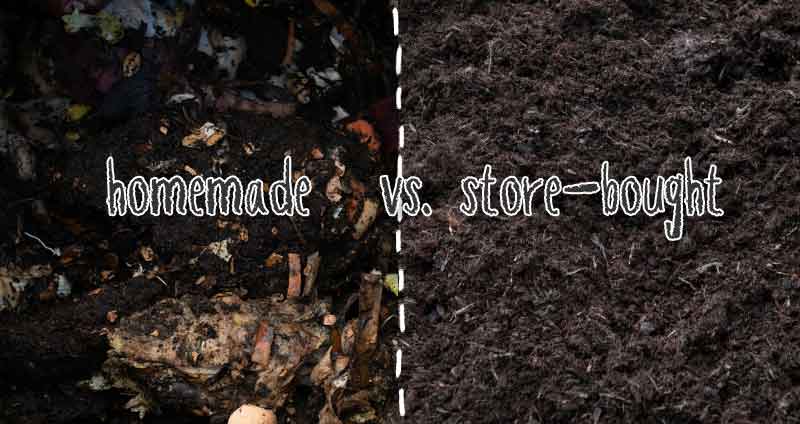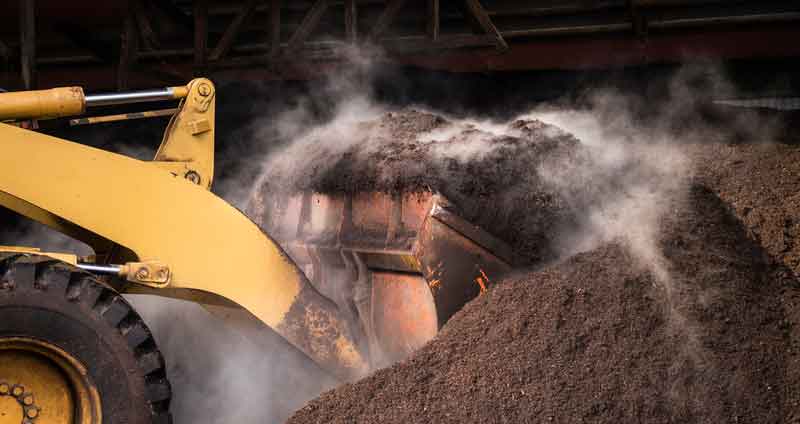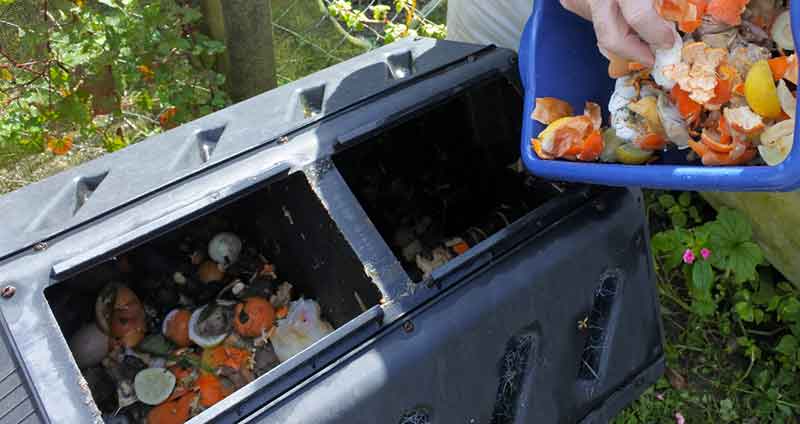Is Homemade Compost Better Than Store-Bought?

You have to admit…
They look very similar.
But the compost you make at home and the stuff you buy in bags have a few fundamental differences.
It’s kind of like comparing a chef’s patisserie with a home-baked cake!
But the underlying question is, “Which one is better”?
The pro stuff or your own humble compost?
You might be surprised by the answer!
Keep reading to get the whole story.
Is bagged store-bought compost any good?

Store-bought compost is a commercially manufactured product made on a large scale. The composting process is carefully controlled to produce “ideal” conditions, breaking down organic ingredients quickly.
The process usually heats up considerably, which provides a couple of advantages for the end product:
- The heat kills weed seeds
- It’s faster
As a result, compost companies get the end product to market quicker. And they can guarantee that it has eliminated a certain number of weed problems. The final product is also screened to remove any non-decomposed pieces.
The finished compost is dark in color (thanks to the high temperatures) and has a fine texture.
So bagged compost is a good quality soil amendment that you can pick up from any nursery or garden center.
But there are a few things you should also be aware of.
Store-bought compost often contains additional fertilizers or boosters! In addition, you’ve probably come across products like “all-purpose” compost or “potting soil.” You can even find compost intended for specific plants or crops. These are growing mediums and are specifically designed for a particular use.
It’s not just compost that’s in the bag!
Some bagged compost is a scientifically designed product that has been developed to enhance plant growth. As well as fertilizers, they are sometimes balanced with other ingredients, so they retain moisture and let the roots breathe. The added fertilizers can be slow-release so that plants thrive over a long period. In some cases, the pH level has been altered to fit the needs acidity requirements of specific plants (ericaceous compost is a perfect example).
So not surprisingly, in certain circumstances, store-bought compost works better!
But of course, you can also buy bagged “pure” compost with no fillers or boosters.
The thing to keep in mind is that store-bought compost is usually made from a single source.
In rural situations, this is farm by-products like manure, straw, and field grass. This allows companies to control the inputs they use and choose their quality. But this also limits the nutrient content because the final compost is made from a limited range of ingredients.
Don’t get me wrong. Commercial compost is still an excellent soil amendment! But its nutrient profile could be lower than some other types of compost.
In urban situations, the source of organic waste is more random!
Also known as “green waste compost,” the ingredients come from whatever is collected by the local community. Household yard trimmings are more challenging to control. One criticism of this source of organic waste is the potential presence of herbicides and pesticides. This can result in chemical residues in the finished product, and it’s not necessarily a good thing for your plants!
Homemade vs bagged compost

So what is the difference between homemade and store bought compost?
One fundamental thing is that you know what you put in your compost bin!
If you’re concerned about organic gardening, you can choose only chemical-free organic materials to put in your composter. And suppose you use a wide variety of different organic matter. In that case, you should end up with a comprehensive nutrient profile in the finished product.
Homemade compost is more fibrous and not as fine-textured as bagged compost. This is because you may not be shredding the ingredients. And most backyard compost systems don’t heat up to very high temperatures, so the products break down more slowly.
This is not a problem. The larger carbon materials also help keep the pile well aerated and working correctly by allowing airflow! So the big chunks in homemade compost are helpful. You might just have to screen them out before using your finished compost (use a compost sifter like this one, or make your own – Amazon link).
So don’t be surprised that homemade compost doesn’t look the same as professionally finished compost. Instead, you’ll find a mixture of well-rotted materials and some partially decomposed stuff as well. (Those photos of home compost bins overflowing with fine crumbly compost are just for marketing)!
But that doesn’t make it any less worthy. In fact, it is probably more nutritious if you’ve taken care of what you put in. And it will be biologically active, which is a good thing.
Bagged compost sometimes has an unfair advantage because it has additional ingredients to improve fertility.
As you can see, your own garden compost differs considerably from commercial growing media, so don’t expect it to perform in the same way 🙂
Keep on composting!

